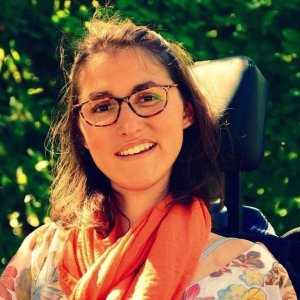Life as a woman with DMD
It is estimated that around 1 in 50 million girls have Duchenne. It may be rare, but it does happen. Girls and women with DMD: Duchenne UK is here to support you. Although it is very rare, we do meet girls with Duchenne. You are as much a part of our DMD community as boys and men.
How do girls develop DMD?
Girls can only develop DMD if they have faults on both their dystrophin genes.
Girls and women can also be ’manifesting carriers’. They experience similar, often milder, symptoms of DMD.
Find out more about how DMD is inherited on our Understanding Duchenne page.
We have been speaking to Feriel, a 26 year old woman living with Duchenne muscular dystrophy. She has written us a short blog about her experiences with Duchenne from diagnosis to now.

“My name is Feriel, I am 26 years old. I am French. I’m a woman with DMD.
I was born in 1991 at six and a half months gestation. My sisters and I are triplets (two twins and a single). My twin carries the gene for DMD and my other sister has Cerebral Palsy.
I started walking when I was 2 years old, but from 3 years old I started to fall over a lot. I had large calves and I walked on tiptoes. The doctors thought it was because of me being born premature and then they thought I had Cerebral Palsy like my sister.
In 1997 a doctor at Garches Hospital gave me a biopsy. Weeks later I was diagnosed with Duchenne Muscular Dystrophy, I was 6 years old.
The doctor at the hospital thought that it was an error made by the genetic laboratory because this disease is very rare in women and the doctor had never seen little girls with this disease. I have a mutation stop (nonsense) of exon 12.
Regarding the progression of my disease:
I used a wheelchair for the first time when I was 10 years old, I lost the ability to walk after surgery on my back in 2008.
In 2012 I had a lung infection. I have had bronchitis twice, once in November 2015 and the other in February 2016.
Since July 2016 I have used a breathing machine at night. When I have congestion, I use a cough assist machine. I have physiotherapy twice a week and my physiotherapist takes care of my breathing, my arms, my legs, my hands and my feet.
I take medication for my heart, blood pressure, asthma, my stomach and my bones. I take a nap every day otherwise I get very tired. I do not have heart problems and my breathing capacity has increased since I started using the breathing machine.
Despite having this difficult and tiring disease, I do a lot of things.
I love traveling. I have visited Cyprus, Spain, Portugal, Malta, Italy, England, Morocco, Tunisia, Mauritania and Cuba. I am going to Senegal in February and I go to Tunisia every summer.
I like to swim. When I swim I feel free, I feel good and the sea is good for my muscles. When I swim it is as if my disease has disappeared.
I like watching football with my dad.
I love singing. I do choral once a week and its good for my breathing. I like going to concerts and dancing. Music is a therapy against the disease.
I like going to the cinema, theatre and museums.
I like reading travel stories as they help me escape.
In short, I love my life, my friends and my family.
In writing this article I think about all they very strong people who have this disease, you are heroes!
I hope a cure is found for all of us.”
Duchenne UK is committed to improving the lives of everyone diagnosed with DMD. If you are a woman with DMD or a parent of a girl with DMD, Duchenne UK are here to support you on your journey. We have produced a set of resources to help you cope with the diagnosis, plan your child’s care, and guidance on how the whole family can live life to the full. Get support for you and your family here.
To support our vital work to fund life-changing research and better care for everyone affected by DMD, donate to Duchenne UK here.